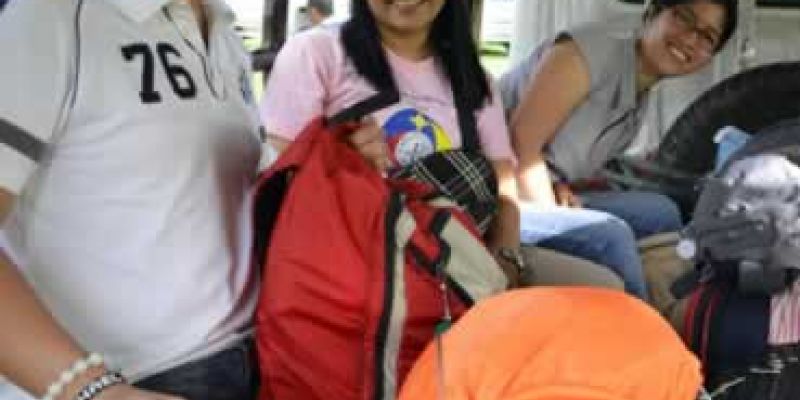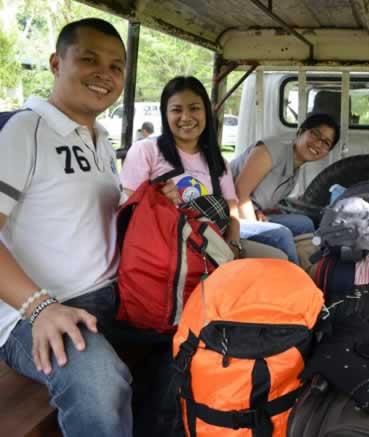
Walking Together
Chile is very far from my native land, with different people, language, culture, climate and food. It is a Catholic country which is very abundant in resources. During my Mission Sending Mass last year, our parish priest asked me why I was going to Chile for mission then. I just answered him, "Yes, Chile is abundant, but I'm sure there is still need for mission there." Although, at that very moment, I really didn't have any idea what mission will be like in Chile, and it was a big challenge for me.
When I arrived in Chile, I lived with a Chilean family while studying Spanish. This is to learn not only their language faster but also to understand their culture. I had many opportunities to share stories with them about our cultures, and even about native food common in the Philippines and in Chile. I observed how they normally gather during the night and have 'once' (night snacks). Usually they would have tea and Being on Mission in Chile maraquetta, a kind of bread that is famous here. One of the things I like most about their culture is the way they always greet one another with a simple "Hola!" (Hi or Hello!), "Buenos Dias" (Good Morning!), "Buenas Tardes o Noches" (Good Afternoon or Evening), "Chao" (Bye!). And they would take time to also ask, "Como Estas?" (How are you?) with a hug and kisses.

Gilda Comayas and Lorna Cañete.
It was not easy studying the language because it was very confusing. I felt comfortable staying with a host family despite not understanding their language because they had been very warm and welcoming to me. I would often ask a lot of questions especially whenever I watched the news or experienced certain situations. Fortunately, my Chilean family and language instructor helped me understand what I wanted to know whenever I asked. I felt I have found a family in this foreign place. They showed me love and care and made me feel like I was part of their family.
After finishing my language studies, I moved to my place of assignment at the St. Columban parish. In the beginning, I still didn't have the confidence to speak with locals, because I was afraid of making mistakes. Every time I spoke, others tried to understand what I said, and I would thank God when we were able to understand each other. Although there were some who would criticize or laugh at my words or the way I pronounced them, in the end, they helped me learn and improve my language. In the parish, there are only a few churchgoers and most of them are elderly. As part of my ministry, I accompany adulto mayores (senior citizens) in the community. I've learned that some of them were abandoned by their families; some are even sick living on their own. There are those who are more fortunate because they're still with their loved ones.
I also noticed that there are very few children who go with their grandparents or parents to the church. Out of curiosity, I began to ask people where the young ones are, and why young parishioners aren't attending Mass regularly. I was told that there are several reasons why they don't go to church such as the elect of the dictatorship, issues related to the church, and some people were just busy with work. It is very sad to know that although they have a great number of Catholics, many are not actively involved in the church.
Since then, I've been forming acolytes in the parish and accompanying the youth, trying to apply what I've learned from my experience. I also go home for visitations. Getting to know and sharing our experiences with their families has a very big impact for me as I was able to gain their trust. I also found out that there are Filipino migrants who work as nannies in the community who were not treated equally by their employers. They even had to "bargain" for their salary and at times had nothing to eat. Their employers take advantage of their inability to speak Spanish. This is why I also try to teach them what I've learned from language class using my old books and hopefully, someday, they can give voice to what they want to say to their employers.
Looking back, I have a better understanding why I was sent here. I feel called to be here for others, sharing myself, my faith, talents, and culture. The poverty that people experience here is not only from material things – they suffer from loneliness, abandonment, injustice, lack of knowledge. There is poverty in spirit and poverty within the Church. But in our poverty, we can also feel richness in the people who surround us, willing to help one another and walk together on our journey of life with Christ.
Columban lay missionary Michael Javier lives and works in Chile.


 The Columbans are a society of missionaries, including priests and lay people, who minister to people of various cultures as a way of witnessing to the universal love of God.
The Columbans are a society of missionaries, including priests and lay people, who minister to people of various cultures as a way of witnessing to the universal love of God.